
Atlas F1 Magazine Writer
Damon Hill's Formula One career is very much entwined with his performace at the French Magny Cours track. He had the worst of times and the best of times there. He experienced the ultimate highs and the absolute lows. Marcel Schot looks back at Hill's eight French Grands Prix
Considering the circumstances, it came as no surprise that Damon continued exactly as Amati, by not qualifying; In Spain, San Marino, Monaco and Canada Hill didn't succeed in making it on the starting grid. And thus, the team arrived in Magny Cours, for the 1992 French Grand Prix.
First practice saw its usual pattern of both Brabhams at the very back of the pack. Van de Poele was the faster of the two, 6.3 seconds behind number one Nigel Mansell and a full second behind the car in front of him, the Fondmetal of Andrea Chiesa. Hill was 30th and last, 1.8 seconds slower than his teammate. However, in the first qualifying session that afternoon, Hill went relatively well, improving his morning time by two seconds. Having said that, while Hill moved up a place ahead of his teammate, the gap towards the rest had only become bigger. But in order to qualify, an additional 1.5 seconds were needed to be shaved off his time. This was, indeed, a hopeless situation.
The free practice session on Saturday went incredibly well for both Brabham drivers. Hill improved by 0.7 seconds - not enough, but there was hope again. His teammate did even better, setting the 27th fastest time, just 0.1 seconds behind number 26 and thus increasing the possibility of a spot on the grid. Sadly, the afternoon qualifying session in which it all had to happen, was another big disappointment. Where most drivers improved their Friday time, Hill went slower. Damon ended up last, 2.7 seconds short of a position on the grid and over seven seconds behind pole-sitter Mansell in the Williams Hill himself was test-driving.
As the Brabham team folded, Hill returned to Williams. As both Nigel Mansell and Riccardo Patrese left Williams, the team had to find replacements. The first was returning World Champion Alain Prost. Hill then was the obvious choice for the second seat. He already knew the team, wasn't too expensive and had a tough learning school at Brabham.
The difference from 1992 was like heaven and hell - with Williams in the role of heaven for Damon. The FW15C was a dream for both Prost and Hill, unbeatable in qualifying and a podium regular in the races. Only Ayrton Senna was capable of staying near Prost, whereas Michael Schumacher in the Benetton was Hill's only rival. In Qualifying, Prost had been the better of the two all season.
On Friday morning for the French Grand Prix that year, Hill was the fastest, but that was merely because Prost was unable to run a proper lap. During the afternoon, Prost finally got underway, posting a time half a second quicker than Damon had set in the morning. However, Hill didn't take it easy either. The Briton improved his time by 1.5 seconds to stay over seven tenths ahead of Prost. On Saturday morning, the two went faster still, now standing over a second ahead of the rest. Furthermore, for the first time during the weekend, Prost was faster than Hill.
Prost was never known as a one-lap wonder, but being behind his inexperienced teammate in his home Grand Prix wasn't a notion he was likely to accept. The Frenchman went all out in the final qualifying session and took four tenths more off the fastest time. Hill in return took two tenths more off Prost's time, to grab his first career pole position. Meanwhile, the competition, headed by fellow Renault users Ligier, was a massive 1.8 seconds behind.
Once the race started, it was all about 'The Williams Show'. While Senna and Schumacher fought behind them, Hill and Prost ran away at a steady rate of 1.5 seconds a lap, Prost continuously on Hill's tail. Only when Damon went in for his stop after 27 laps, Prost was able to grab the lead. The Frenchman's stop was marginally quicker and he returned to the track just ahead of Hill. In the remaining part of the race, the Williamses ran nearly identical times. 40 laps on, the difference was never bigger than three tenths of a second, but Hill had no way past Prost. When the checkered flag dropped, Hill was again second, but this time he had proven he could be just as fast as Prost over a full race.
In 1994, Prost retired and again took the number one out of the championship. Damon Hill was again the one to carry 0 on his car, as his new teammate was none other than Ayrton Senna. However, after three races, Senna was tragically killed and Hill became the team's leading driver, with rookie test-driver David Coulthard as his teammate.
The season soon became all about Michael Schumacher's cakewalk. By France, the seventh round of the year, Schumacher was leading Hill by 33 (!) World Championship points, and had grabbed five wins from six starts (the sixth handed to Hill due to a gearbox failure in Schumacher's Benetton).
Hill grabbed provisional pole in his first attempt. Quickly after that, Schumacher was demoted to third, as Mansell beat Hill's time. Only towards the end of the session the pole time improved again, but not by Schumacher; Damon Hill grabbed the pole in the French Grand Prix for the second year in a row.
This time, however, Hill's pole position was quickly turned to dust when Michael Schumacher took off like a rocket at the start of the race. Hill managed to get away in second and stuck close to the German throughout the first stint. And to add to the excitement, the pair went into the pits at the same time. Schumacher came out again ahead of Hill, but now the Williams driver wasn't able to follow his rival as close as before. However, what Schumacher knew and Hill didn't, was that the German had planned for three stops rather than two.
Hill briefly took the lead as the Benetton driver made his second stop halfway through the race, but when Hill had to go in himself again, six laps later, the German was back in the lead again. The advantage of having less fuel and fresher tyres then helped Schumacher to secure a gap large enough to keep the lead after his final stop. For Hill, it couldn't have been more frustrating in France; for the second year in a row he started from pole only to finish second.
The next year Hill was partnered full-time with Coulthard, and was facing yet again archrival Michael Schumacher. The relationship of the two contenders dropped to considerable depths throughout the season, resulting in harsh remarks from both camps and a few shunts on the track.
The French Grand Prix, again the seventh round of the season, saw Hill with a smaller gap to Schumacher than the year before and with more wins in his rack: Schumacher led Hill by merely 7 WC points, and they had 3 and 2 wins each, respectively.
Qualifying at Magny Cours echoed the grid of years before, with Damon Hill leading the way. At first, in the Friday session, he was just slightly ahead of Coulthard and three tenths ahead of Schumacher, but on Saturday Coulthard wasn't able to improve his pace as much as the other two, and again it was Hill on pole, with Schumacher beside him.
In the round of pitstops, Schumacher was the first to go in, coming out in third, behind Coulthard. The young Williams driver then stopped a lap later, followed by his teammate yet another lap later. When the dust settled, Schumacher was leading, with Hill, Ligier driver Martin Brundle and Coulthard following. However, Schumacher was not only leading, he was leading by eight seconds - by stopping two laps later, Damon had encountered much more backmarker traffic than his rival. This effectively sealed the race and Schumacher again went home with the big prize after Hill scored his third consecutive 2nd place from pole in France.
For 1996, Hill's main rival wasn't Schumacher anymore. The German had switched from Benetton to the rebuilding Ferrari team and was now hardly a threat. Instead, rivaly came from within Hill's own team in the form of rookie Canadian Jacques Villeneuve.
Unlike the rest of the season, the Williamses weren't quite dominating in France's Friday practice. Hill only managed to put in a sixth place, after having quite a scare in the morning session, when he lost the car in the chicane and lost touch with planet Earth for a second.
As the free practice session on Saturday was run on a drying track, times didn't mean much. In the afternoon session the track was completely dry again, and this was the only session that really counted, because as of 1996, there was only a single qualifying session instead of the usual two.
After three years of pole, Hill was now beaten, albeit by the smallest of margins. Michael Schumacher had a perfect qualifying in the underpowered Ferrari to beat Hill by just 0.069 seconds. However, Damon wasn't too worried as he knew all too well that Pole in France wasn't a guarantee for success in the race. Still, Hill became the man at the front of the grid once the race started. Schumacher's Ferrari didn't make it through the warm-up lap as his engine went up in smoke. This cleared the road to the victory Damon had missed out on so closely three times before.
For 1997, things were very different for Hill. After winning the Championship with Williams the year before, Frank Williams decided not to renew Hill's contract. Surprisingly, Hill ended up at Tom Walkinshaw's Arrows team. This condemned the World Champion to mediocrity and France was no exception. After a wet Friday session in which the Bridgestone tyres helped Hill to a 13th place, it dried out again and Hill was back to 20th in the Saturday morning session, only beating the Minardis of Tarso Marques and Ukyo Katayama.
After the disappointing Arrows adventure, Hill joined the Buzzing Hornets at Jordan. Initially, this move proved to be a total disaster, as both Hill and his teammate Ralf Schumacher were without points when they arrived at France, for the eighth round of the Championship. Practice at Magny Cours gave hope of changing that dreadful status.
Good showings in the free practice sessions paid off in qualifying, where the team was surprisingly battling for the title of third best team with Williams. In the end, Ralf Schumacher was sixth and Damon seventh, a feat that pleased everyone at Jordan very much. Moreover, both the Jordans were able keep the same pace in the race. However, that did not last long: after just 19 laps Hill retired, unable to use his gearbox or accelerator anymore.
The race after France, things turned the right way for Jordan and in Belgium Hill even headed a historic 1-2, securing Jordan's first victory. Not surprisingly, then, Hill opted to remain with Jordan for the 1999 season, which was to prove to be his last - and perhaps worst ever. The former World Champion appeared to have lost interest in racing altogether and competitive moments were few and far between.
While the free practice sessions in France showed a similar pattern to the previous year, Hill was unable to achieve the same qualifying position as in 1998. This, however, didn't have much to do with Hill. The qualifying session was run in the wet, and it was just a matter of who came out when that determined the driver's position on the grid. And while Hill's new teammate Heinz-Harald Frentzen was very much at home in the wet, Damon looked lost and finished in 18th place, just behind Ferrari's Eddie Irvine.
Hill's last race in France was going well until the first pitstop. Hill came out of the pitlane only to be hit by Arrows driver Pedro de la Rosa and the unfortunate Briton had to go drive back into the pits to have his punctured tyre replaced. By now, the Briton was in last position and as if his luck wasn't bad enough, his engine failed just as the pace car came onto the track because of the excessive rain.
After that race, Damon Hill announced his retirement. And he was never the same again.
Damon Hill's career has been a very curious one. The Briton entered Formula One relatively late and initially didn't impress much in the ailing Brabham team. Later on he went to great heights with Williams, only to return to mediocrity with Arrows and finally Jordan. His experience at the French Grands Prix showed these ups and downs like no other venue, to tell a tale of triumph and tragedy in the middle of nowhere.
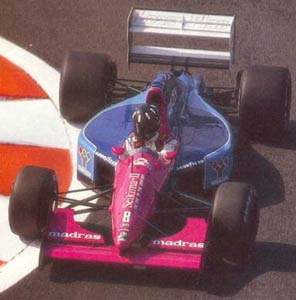 Brabham started their final year with Belgian Eric van de Poele in the first car and Giovanna Amati in the second. However, after just three races the extraordinary woman racer was replaced by Damon Hill, the son of the great Graham Hill. It was in fact only his test-drive at Williams that got him the seat, as his open wheel racing credentials were less than impressive (Hill made his path in racing motorcycles). Brabham of course were happy with any driver and in reality Hill was the one who got the worst deal of the two. The BT60 was light years away from competitiveness and the Judd V10 engine lacked in about every aspect you can think of.
Brabham started their final year with Belgian Eric van de Poele in the first car and Giovanna Amati in the second. However, after just three races the extraordinary woman racer was replaced by Damon Hill, the son of the great Graham Hill. It was in fact only his test-drive at Williams that got him the seat, as his open wheel racing credentials were less than impressive (Hill made his path in racing motorcycles). Brabham of course were happy with any driver and in reality Hill was the one who got the worst deal of the two. The BT60 was light years away from competitiveness and the Judd V10 engine lacked in about every aspect you can think of.
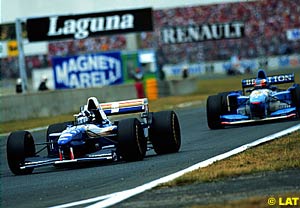 One of the oddest affairs of 1993 was Hill's car number. As the number 1 is awared to the World Drivers' Champion, Nigel Mansell was the one that took the number to his team of the next season. However, Mansell left Formula One and thus Williams was appointed the numbers 0 and 2, rather than 1 and 2. Prost wasn't interested in driving a zero car and thus Hill took to the circuit with the big 0 on his car.
One of the oddest affairs of 1993 was Hill's car number. As the number 1 is awared to the World Drivers' Champion, Nigel Mansell was the one that took the number to his team of the next season. However, Mansell left Formula One and thus Williams was appointed the numbers 0 and 2, rather than 1 and 2. Prost wasn't interested in driving a zero car and thus Hill took to the circuit with the big 0 on his car.
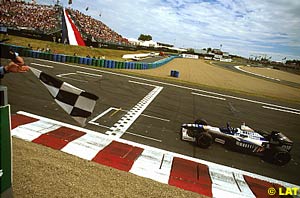 Hill was partnered by Nigel Mansell for the French Grand Prix. On Friday, Schumacher outpaced the entire field by half a second. Hill was only third, as Ferrari's Gerhard Berger beat him by less than one tenth. Saturday morning was even worse for Hill, as he was unable to drive for a large part of the session, with a gearbox problem. With the car being ready for the afternoon qualifying session, Hill was eager to go out on the track.
Hill was partnered by Nigel Mansell for the French Grand Prix. On Friday, Schumacher outpaced the entire field by half a second. Hill was only third, as Ferrari's Gerhard Berger beat him by less than one tenth. Saturday morning was even worse for Hill, as he was unable to drive for a large part of the session, with a gearbox problem. With the car being ready for the afternoon qualifying session, Hill was eager to go out on the track.
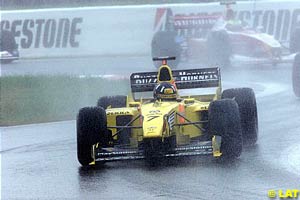 With the memories of the 1994 start still fresh, Hill seemed to be more alert at the start, which in turn payed off - he took the lead into the first corner, with Schumacher following closely. The situation didn't change much and only when the first round of pitstops arrived, the places changed. However, that didn't mean there was no action. After 13 laps, the bright yellow mobile chicane called Forti appeared ahead of the leaders. As Damon Hill went by Moreno's car, it appeared as if he lost momentum for a second. Schumacher, surprised by Hill's action, was barely able to avoid a collision.
With the memories of the 1994 start still fresh, Hill seemed to be more alert at the start, which in turn payed off - he took the lead into the first corner, with Schumacher following closely. The situation didn't change much and only when the first round of pitstops arrived, the places changed. However, that didn't mean there was no action. After 13 laps, the bright yellow mobile chicane called Forti appeared ahead of the leaders. As Damon Hill went by Moreno's car, it appeared as if he lost momentum for a second. Schumacher, surprised by Hill's action, was barely able to avoid a collision.
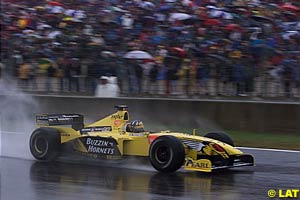 In the afternoon, Hill's situation slightly improved, but 17th was he could manage. Moreover, at the start, all hopes for a good classification went up the chimney when Damon got pushed into the gravel, losing his front wing in the process. When the wing was replaced, the Briton had already been lapped and there was nothing more to do than try to finish the race, which he duly did - in last place, three laps behind the winner Michael Schumacher.
In the afternoon, Hill's situation slightly improved, but 17th was he could manage. Moreover, at the start, all hopes for a good classification went up the chimney when Damon got pushed into the gravel, losing his front wing in the process. When the wing was replaced, the Briton had already been lapped and there was nothing more to do than try to finish the race, which he duly did - in last place, three laps behind the winner Michael Schumacher.
Please Contact Us for permission to republish this or any other material from Atlas F1.
|
Volume 7, Issue 26
Atlas F1 Special
Rules are Rules
Team Connaught Part IV: Remembrance of Things Fast
European GP Review
The European GP Review
Reflections from the Nurburgring
A Season of Halves
Harry-Heinz is History
French GP Preview
Technical Preview: France
Focus: Hill at Magny Cours
Columns
Season Strokes - the GP Cartoon
The French GP Trivia Quiz
The Weekly Grapevine
> Homepage |